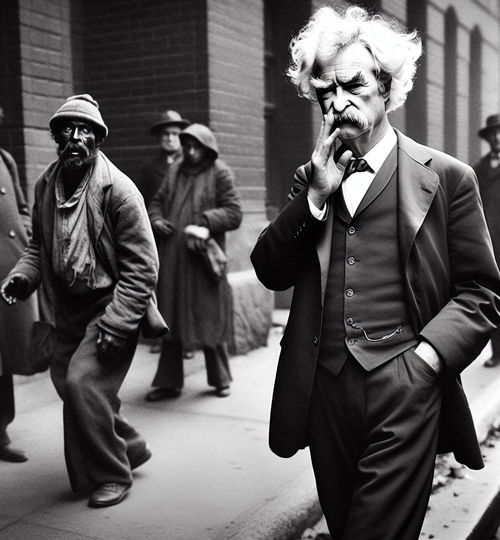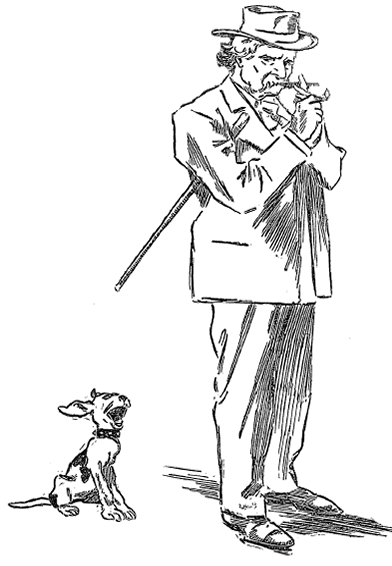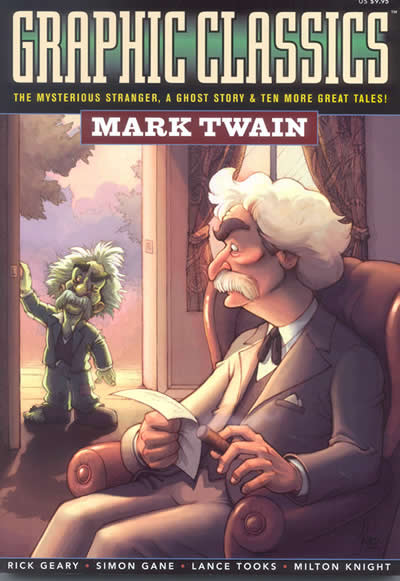

|
How common it is to pass an old street corner beggar, then slacken
your pace for 2 blocks, stop, turn, go back & settle with your conscience.
|
 AI image created by R. Kent Rasmussen |
|
Our conscience takes no notice of pain inflicted on
others until it reaches a point where it gives pain to us. In all cases
without exception we are absolutely indifferent to another person's pain
until his sufferings make us uncomfortable.
- What is Man? |
 |
Mine was a trained Presbyterian conscience and knew but
the one duty--to hunt and harry its slave upon all pretexts and on all
occasions, particularly when there was no sense nor reason in it. An uneasy conscience is a hair in the mouth. It takes up more room than all the rest of a person's
insides, and yet ain't no good nohow. If you grant that one man's conscience doesn't know right
from wrong, it is an admission that there are others like it. This single
admissions pulls down the whole doctrine of infallibility of judgment
in consciences. |
|
In those old slave-holding days the whole community was agreed as to
one thing--the awful sacredness of slave property. To help steal a horse
or a cow was a low crime, but to help a hunted slave, or feed him or shelter
him, or hide him, or comfort him, in his troubles, his terrors, his despair,
or hesitate to promptly to betray him to the slave-catcher when opportunity
offered was a much baser crime, & carried with it a stain, a moral
smirch which nothing could wipe away. That this sentiment should exist
among slave-owners is comprehensible--there were good commercial reasons
for it--but that it should exist & did exist among the paupers, the
loafers the tag-rag & bobtail of the community, & in a passionate
& uncompromising form, is not in our remote day realizable. It seemed
natural enough to me then; natural enough that Huck & his father the
worthless loafer should feel it & approve it, though it seems now
absurd. It shows that that strange thing, the conscience--the unerring
monitor--can be trained to approve any wild thing you want it to approve
if you begin its education early & stick to it. If I had the remaking of man, he wouldn't have any conscience. It is
one of the most disagreeable things connected with a person; and although
it certainly does a great deal of good, it cannot be said to pay, in the
long run; it would be much better to have less good and more comfort.
Still, this is only my opinion, and I am only one man; others, with less
experience, may think differently. They have a right to their view. I
only stand to this: I have noticed my conscience for many years, and I
know it is more trouble and bother to me than anything else I started
with. I suppose that in the beginning I prized it, because we prize anything
that is ours; and yet how foolish it was to think so. If we look at it
in another way, we see how absurd it is: if I had an anvil in me would
I prize it? Of course not. And yet when you come to think, there is no
real difference between a conscience and an anvil--I mean for comfort.
I have noticed it a thousand times. And you could dissolve an anvil with
acids, when you couldn't stand it any longer; but there isn't any way
that you can work off a conscience--at least so it will stay worked off;
not that I know of, anyway. |
|
All the consciences I have ever heard of were nagging,
badgering, fault-finding, execrable savages! Yes; and always in a sweat
about some poor little insigificant trifle or other--destruction catch
the lot of them, I say! I would trade mine for the small-pox and seven
kinds of consumption, and be glad of the chance. It seems to me that a man should secure the well done,
faithful servant, of his own conscience first and foremost, and let all
other loyalties go. Good friends, good books and a sleepy conscience: this
is the ideal life.
|
 Cover illustration of "The Facts Concerning the Recent Carnival of Crime in Connecticut" from GRAPHIC CLASSICS: MARK TWAIN Available from amazon.com |
Quotations | Newspaper Articles | Special Features | Links | Search